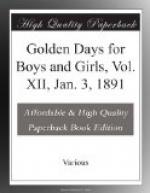He was disappointed to find the room empty. His father had promised to give him some money to buy powder, shot and caps for the new gun he had received on Christmas Day, and, like all boys, he felt that time was very precious when he was going to buy anything of that sort.
“Now I suppose I’ve got to wait,” he soliloquized, as he threw himself into the swivel-chair in front of his father’s desk. “It’ll be noon before I get a chance to try the gun, I dare say.”
He played with a paper-cutter at first; but soon his attention was attracted by a letter on the desk, the superscription of which was in a familiar hand.
He picked it up at once, for his Aunt Susan Dent’s letters were always public property at home. His father never failed to bring them home and read them aloud at the supper-table. So Sidney drew this letter from the envelope without hesitation.
He had always received a five-dollar bill every Christmas from his aunt, but this year the day had come and gone without the customary present, and he gave an exclamation of joy when, on unfolding the letter, a five-dollar bill fell out.
“For me, of course. Better late than never,” muttered Sidney, as he hastily glanced over the letter.
Yes, his aunt intended the money for him.
She wrote that she had been too ill to write just before Christmas, but that Sidney would probably rather have the gift come late than not at all.
“Well, I should say so!” ejaculated Sidney. “And now I needn’t wait for father. I can use this money to buy my ammunition, and tell him about it at dinner time.”
He restored the letter to its envelope, and then let himself out at the alley door. In five minutes he was in the nearest hardware store, bargaining for his shot.
His mind was full of the sport he expected to have that afternoon in the woods with his gun, and when he reached home he sprang up the steps two at a time.
He was about to ring, with no gentle hand, when the door was thrown open by his sister Fannie.
“We’ve been watching for you, Sidney,” she said, in some excitement. “Uncle Charles is here, and wants you to go home with him for two or three days. He says he can promise you a splendid time. You’ll have to hurry, though, for the train leaves at twelve o’clock, and it is half-past eleven now. We were so afraid you wouldn’t get back in time.”
“Hurry, Sidney,” said his mother, appearing at the parlor door. “Change your clothes as quickly as possible. I have packed your valise for you.”
“No time to waste, my boy,” said his uncle, from the dining-room, where he was snatching a hasty lunch, attended by Clara. “The train won’t wait for us.”
Sidney was soon ready, and, with a hasty good-by to his mother and sisters, hurried off with his uncle.
“And be sure you come back Friday night, Sidney,” called out his sister Fannie, as she followed him to the front gate. “Don’t ‘fully intend’ to do it, and then come walking in here on Sunday. You know you’ve got to make calls on New Year’s Day.”




